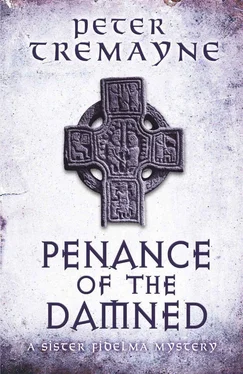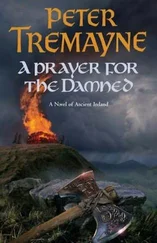Peter Tremayne - Penance of the Damned
Здесь есть возможность читать онлайн «Peter Tremayne - Penance of the Damned» весь текст электронной книги совершенно бесплатно (целиком полную версию без сокращений). В некоторых случаях можно слушать аудио, скачать через торрент в формате fb2 и присутствует краткое содержание. Год выпуска: 2016, Издательство: Headline, Жанр: Исторический детектив, на английском языке. Описание произведения, (предисловие) а так же отзывы посетителей доступны на портале библиотеки ЛибКат.
- Название:Penance of the Damned
- Автор:
- Издательство:Headline
- Жанр:
- Год:2016
- ISBN:нет данных
- Рейтинг книги:5 / 5. Голосов: 1
-
Избранное:Добавить в избранное
- Отзывы:
-
Ваша оценка:
- 100
- 1
- 2
- 3
- 4
- 5
Penance of the Damned: краткое содержание, описание и аннотация
Предлагаем к чтению аннотацию, описание, краткое содержание или предисловие (зависит от того, что написал сам автор книги «Penance of the Damned»). Если вы не нашли необходимую информацию о книге — напишите в комментариях, мы постараемся отыскать её.
Penance of the Damned — читать онлайн бесплатно полную книгу (весь текст) целиком
Ниже представлен текст книги, разбитый по страницам. Система сохранения места последней прочитанной страницы, позволяет с удобством читать онлайн бесплатно книгу «Penance of the Damned», без необходимости каждый раз заново искать на чём Вы остановились. Поставьте закладку, и сможете в любой момент перейти на страницу, на которой закончили чтение.
Интервал:
Закладка:
There was a short silence when she had finished speaking.
Then Abbot Nannid rose again, his voice tight with anger. ‘You have listened to the beguiling voice of a lawyer. A lawyer who has an interest in ensuring that you reject the teachings of the New Faith. The fact is that she was once a member of the religious herself but now acts as her brother’s legal adviser; a woman who cleaves to the ancient laws that were devised and transmitted from pagan times. I am no lawyer. I am a plain and simple man who maintains that the words of the Faith must be obeyed. What I say is this: the Penitentials have been brought to our land as part of the Faith which we have adopted and, notwithstanding our past, these rules must govern our behaviour now and in the future. That is why we, we of the Ui Fidgente, are leading the way in the Faith by the fact that our abbeys and churchmen accept the Penitentials as the law to be obeyed above all other law.’
Prince Donennach again had to raise his hand to silence the hubbub that followed.
‘There is much to be considered here. I must, however, point out that I rule here under the law of the Fenechus. How then can I give judgement under the rules of the New Faith?’
‘That is a matter for the council of chieftains to decide, which council must sit with the bishops and abbots of the Ui Fidgente who have equal rights as the nobles of the people,’ Brehon Faolchair declared. ‘But as I understand Abbot Nannid’s immediate argument – the argument he has continued to press – Abbot Segdae was a leading churchman, an abbot and a bishop. Therefore his killer should be punished under the laws of the Church.’
Prince Donennach turned with a questioning look at the Prior of Imleach.
‘What is your response, Prior Cuan? You now stand in place of the Abbot of Imleach and are now senior churchman of the King of Cashel. Do you agree with this?’
The cleric painfully rose to his feet, leaning his weight on his blackthorn stick. ‘Imleach is not governed by the Penitentials. Abbot Segdae, may he rest in peace, believed in the old laws and would not wish his death to be a cause of such changes in any part of the Kingdom of Muman, of which he was Chief Bishop.’
‘You know this for a fact, brother?’ Abbot Nannid called out rudely. ‘After all, Abbot Segdae is dead and not able to come forward, is he, to affirm what you say.’
Fidelma exhaled sharply in exasperation. ‘I think there are enough people who knew Abbot Segdae during his lifetime to confirm his beliefs.’
‘I refer to witnesses who are without bias,’ Abbot Nannid replied complacently. ‘You are an Eoghanacht and an advocate of those laws you uphold over the rules of the Christ.’
Fidelma was once more on her feet, her eyes flashing with fury.
‘I was not aware that these rules were laid down by anyone other than those men who decided that their isolated communities needed guidance – many years after Christ was crucified! You should know enough of the law of your people – the law you now want to reject – to know that the oath of the Brehons is to maintain the truth, and pledges are given which are forfeit if their judgement is found false. I am, indeed, an Eoghanacht and have long known that the very term is considered a badge of antagonism to one of the Ui Fidgente!’
‘Fidelma!’ The quiet word from Prince Donennach was enough of a warning not to let her temper overstep the mark. She sat down, biting her lip, trying to ignore the broad smile on Abbot Nannid’s twisted features.
Prince Donennach had caught sight of the expression on Eadulf’s face. He gazed at him thoughtfully. ‘You look as if you want to contribute a comment, Brother Eadulf?’
There were some startled gasps from the company and even Fidelma looked surprised at the invitation.
‘He is a foreigner and has no right to speak here!’ Abbot Nannid immediately asserted. ‘Even if the sister of the King of Cashel has married him, he has no such right.’
Eadulf coloured and would have remained silent but Prince Donennach took no notice of the abbot’s protest.
‘I am inviting Brother Eadulf to speak here and he does so under my authority,’ he said quietly. ‘I remember how Eadulf used his healing skills on me many years ago when a would-be assassin shot an arrow into my leg. No one asked then if he had a right to do so.’
‘He will only say what she wants him to say!’ the abbot interrupted again, causing Fidelma to start to rise from her seat.
But Donennach replied sharply: ‘I know, further, that when he speaks he will speak with his own voice.’
Eadulf stood up slowly.
‘Indeed, I will speak on my own terms,’ he began. ‘I represent no one in my opinions but myself. Had I sought to ingratiate myself with the views of my wife or her family, the Eoghanacht, as Abbot Nannid implies, then you would be seeing me here with the tonsure of John on my head instead of that of Peter. I have continued to wear it to indicate my religious allegiance for many years. Unlike some, I do not wear the tonsure of John yet uphold the rules of Peter of Rome, Abbot of Mungairit. I am no fawning dog who will do what pleases the moment.’
This was said in an even tone, devoid of rancour. Some of those attending suppressed chuckles while Abbot Nannid’s face whitened.
‘So how do you see this predicament, Brother Eadulf?’ enquired Prince Donennach before the abbot could gather his wits to respond.
‘I see no predicament in the matter of law. In my own country I was an hereditary gerefa before I enter the religious. I came and studied in this land of the Five Kingdoms before travelling to Rome, where I embraced the theology of Rome. I have travelled to many lands in which the New Faith was adopted, but in all of them they have kept their own laws so long as they were compatible with the New Faith. You have your own laws without which you would not have existed, these countless centuries. Rome has no more changed her native laws in favour of John the Ascetic’s rules for his community than you should. That is all I have to say.’
‘Such comments are appreciated, Brother Eadulf.’ Prince Donennach sighed gently. ‘However, I am still left with a choice of two possibilities. One is that I authorise the punishment of Gorman to be given under the laws of the Fenechus, in accordance with the wisdom of our Brehons. In that case I court the disapproval of my clergy. The second choice is that I do as the abbot demands and prescribe punishment under the Pententials. In the second case the punishment is extreme and would bring conflict to this land.’
Abbot Nannid was smiling thinly. ‘You must think well on this matter, Prince Donennach. The first choice also leads to conflict.’
‘Conflict in what manner?’ demanded Conri, the warlord, belligerently.
The Abbot of Mungairit gave him an amused glance. ‘I did not hear that a warrior was invited to express opinion here or ask questions.’
‘Nevertheless, the commander of my warriors has a pertinent question even if it is not protocol for him to ask it. I shall then ask it in his stead. You may answer to me, Abbot Nannid.’
‘All I say is that many of the Ui Fidgente are prepared to defend their Faith – with the sword if necessary. Prince Donennach, the fate of the Ui Fidgente has passed into your hands. After the Eoghanacht defeated our armies at Cnoc Aine and Prince Eoghanan was slain, you have steered a course of peace for our people. Some have whispered it was peace at any cost. You recently went to seek the approval of the High King for the course you have pursued. But remember that you rule by the will of your derbhfine and the approval of all your people. The Church has, through me, formed an opinion about what should befall the murderer of one of the leading churchmen of the Five Kingdoms. That opinion would be ignored at the peril of undoing all your strivings for peace.’
Читать дальшеИнтервал:
Закладка:
Похожие книги на «Penance of the Damned»
Представляем Вашему вниманию похожие книги на «Penance of the Damned» списком для выбора. Мы отобрали схожую по названию и смыслу литературу в надежде предоставить читателям больше вариантов отыскать новые, интересные, ещё непрочитанные произведения.
Обсуждение, отзывы о книге «Penance of the Damned» и просто собственные мнения читателей. Оставьте ваши комментарии, напишите, что Вы думаете о произведении, его смысле или главных героях. Укажите что конкретно понравилось, а что нет, и почему Вы так считаете.












